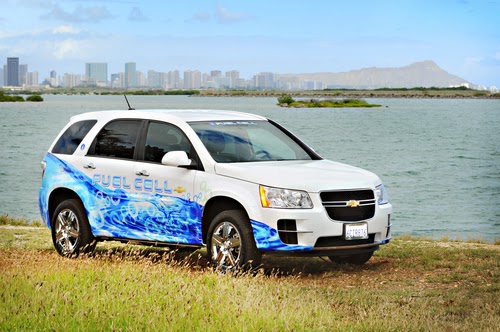Fuel cell’s seem like this magic technology – you pour in a clean fuel (hydrogen and oxygen) and out comes clean energy (electricity) and water. Make a fuel cell big enough to power a car, or truck, and you’ve got a “clean” vehicle that can go a few hundred miles at a time (depending on hydrogen tank size) and can be recharged in a few minutes. Supposedly.
Lots of money is being allocated to fuel cell vehicle deployment, and the car companies are spending lots of research dollars on developing those vehicles. All under the theory that fuel cell vehicles are clean, and that we need clean vehicles to combat climate change global warming and other environmental issues.
But – the theory doesn’t hold water, because a close look says there’s more to FCEV environmental impact than the water vapor coming out the tailpipe. It may even be that FCEV’s are worse than gasoline powered vehicles. (see links below)

![]() This isn’t an academic debate. It’s a matter of allocating government and business dollars wisely to get the hoped-for result of avoiding climate change & environment catastrophes, and improving our collective quality of life. California is getting ready to spend $46 million on hydrogen refueling stations, that are expensive to build and slow to deploy. Honda, Toyota, Hyundai and several other automakers are pushing fuel cell vehicle development while delaying battery electric vehicle development. Even Nissan is doing fuel cell research while at the same time pushing the Nissan Leaf.
This isn’t an academic debate. It’s a matter of allocating government and business dollars wisely to get the hoped-for result of avoiding climate change & environment catastrophes, and improving our collective quality of life. California is getting ready to spend $46 million on hydrogen refueling stations, that are expensive to build and slow to deploy. Honda, Toyota, Hyundai and several other automakers are pushing fuel cell vehicle development while delaying battery electric vehicle development. Even Nissan is doing fuel cell research while at the same time pushing the Nissan Leaf.
Hydrogen refueling stations are $2 million apiece – while DC Quick Charging stations cost much less to build.
If fuel cell vehicles really are so bad, worse than gasoline vehicles, then it’s a waste of real dollars to develop fuel cell vehicles, and we’d be better off with other technologies.
I’m trying to not do the circular firing squad thing. What do we do if a technology is so ill-suited that it just doesn’t make sense?
The question we have to ask is – where does the energy (fuel) come from? What is its impact?
Hydrogen generally doesn’t exist on its own anywhere other than interstellar gas or inside stars. Instead hydrogen is bound into the vast majority of chemical compounds around us.
Typically hydrogen for fuel cell vehicles is extracted from natural gas. And therein lies the problem, because it means fuel cell vehicles are really fossil fuel powered. Yes, hydrogen can be electrolyzed from water, but is that the most efficient source of hydrogen?
Energy efficiency is important – what effect is created from a given number of kilowatt-hours? Is the best use of those kilowatt hours spent on extracting hydrogen or refueling battery packs? I haven’t done the math, but the fact that hydrogen is typically extracted from natural gas implies it’s the more energy efficient method.
Well-to-wheel production of hydrogen causes 13.201 kilograms of CO2 emission per kilogram of hydrogen. (see links below)
Well-to-wheel production of gasoline causes 11.132 kilograms of CO2 emission per gallon of gasoline. (see links below)
Doing some more math to equivalence these for comparison, and inventing the term MPGp (miles per gallon gasoline equivalent well-to-wheel CO2 production) we get (see links below) some interesting figures:
Hyundai ix35 Tuscon FCV w/ 134 hp drive train, 265 mile range on 5.6 kilogram hydrogen tank, gets 47 miles per Kg of Hydrogen, for 39.62 MPGp. Give the same vehicle a gasoline drive train, a 1.6 liter 135 hp gas engine, and it achieves 34.95 MPGp. Give that same vehicle a diesel drive train, Hyundai makes it with a 2.0 liter 148 hp Diesel (37.93 MPGp) and a 1.7 liter 117 hp Diesel (41.76 MPGp). Hyundai just started delivering the ix35 Tuscon FCV in California![]() .
.
Mercedes B-Class 134 hp F-Cell, 52 miles per Kg of Hydrogen, gets 43.84 MPGp. The same vehicle, with a 1.6 liter gasoline engine, gets 38.44 MPGp, and with a Diesel gets 50.47 MPGp.
When automakers install different drive trains in the same vehicle, we can make direct comparisons like this. The bigger the MPGp the better, because a driver can go further per unit of harmful environmental impact.
Therefore, fuel cell vehicles do not live up to the hype and do not provide a huge positive benefit. High efficiency diesels can do much better. And if we’re going to use natural gas as the feedstock, wouldn’t a CNG engine be more efficient?
What does live up to the hype, and does produce the huge environmental gain, is battery electric vehicles driven on renewable clean electricity. The electric car + solar panel dream really works.
What’s even more interesting is applying the same analysis to electric vehicles. In this case we ahve to calculate the cleanliness of electricity based on its source. Coal, of course, is dirty, while wind turbines are not.
The US national grid average is 0.610 Kg CO2 per KWh. In California, PG&E’s electricity mix is 0.238 Kg CO2 per KWh. In Norway, it works out to 0.003 Kg CO2 per KWh.
Doing some math (see links below) we can calculate MPGp for different battery electric cars for given electrical mixes.
Tesla Model S P85 US Grid Average 18.249 / 0.359 = 50.83 MPGp
Tesla Model S P85 California PG&E 46.773 / 0.359 = 130.27 MPGp
Tesla Model S P85 Norway Grid 3710.67 / 0.359 = 10,336.13 MPGp
Chevrolet Spark EV US Grid Average 18.249 / 0.304 = 60.03 MPGp
Chevrolet Spark EV California PG&E 46.773 / 0.304 = 153.85 MPGp
Chevrolet Spark EV Norway Grid 3710.67 / 0.304 = 12,206.15 MPGp
Hence, the Tesla Model S in Norway is 235 times better for the environment than the Mercedes B-Class F-Cell. That’s just because Norway’s electrical supply is so clean … That’s a post for another day as to why, but the numbers come from the IPCC![]() .
.
By the way – some make the argument that battery electric vehicles aren’t clean because they’re just coal powered. These numbers show that idea doesn’t hold water. BUT MORE IMPORTANTLY, they show that moving to renewable electricity sources can make a HUGE impact.
Part of the problem is that California’s ZEV regulations favors fuel cell vehicles. Manufacturers earn more ZEV credits per fuel cell vehicle than they do on a battery electric vehicle. Does that mean automakers looking to sell compliance cars get more bang for the buck with fuel cells?
Another part of the problem is that natural gas powered fuel cell vehicles are part of the enemy. That is – the real enemy is fossil fuels. Battery electric vehicles can get their electrons from wind turbines and sunlight, and that’s not true for hydrogen extracted from natural gas.
CleanTechnica posted today a long (and I do mean long) open letter from Julian Cox to the California Energy Commission completely demolishing the idea that fuel cell vehicles are a good idea![]() , and showing well-to-wheel analyses that FCEV’s are worse than gasoline powered equivalents. All the numbers above come from that article. He goes into a huge amount of detail, but the crux of the argument is what I just said – hydrogen derived from natural gas means FCEV’s are worse, in terms of greenhouse gas emissions, than gasoline powered cars.
, and showing well-to-wheel analyses that FCEV’s are worse than gasoline powered equivalents. All the numbers above come from that article. He goes into a huge amount of detail, but the crux of the argument is what I just said – hydrogen derived from natural gas means FCEV’s are worse, in terms of greenhouse gas emissions, than gasoline powered cars.
Another article worth reading is Hydrogen Vehicles Fail; Electric Vehicles Win![]() , by Jason Jungreis, an electric vehicle advocate living in San Francisco. He lays out a multi-pronged case that fuel cell vehicles are bad, worse than electric vehicles, on several fronts, and that electric vehicles are great. Uh, that’s overly-simplified, go read his post it’s worth it.
, by Jason Jungreis, an electric vehicle advocate living in San Francisco. He lays out a multi-pronged case that fuel cell vehicles are bad, worse than electric vehicles, on several fronts, and that electric vehicles are great. Uh, that’s overly-simplified, go read his post it’s worth it.
- Highway design could decrease death and injury risk, if “we” chose smarter designs - March 28, 2015
- GM really did trademark “range anxiety”, only later to abandon that mark - March 25, 2015
- US Government releases new regulations on hydraulic fracturing, that some call “toothless” - March 20, 2015
- Tesla Motors magic pill to solve range anxiety doesn’t quite instill range confidence - March 19, 2015
- Update on Galena IL oil train – 21 cars involved, which were the supposedly safer CP1232 design - March 7, 2015
- Another oil bomb train – why are they shipping crude oil by train? – Symptoms of fossil fuel addiction - March 6, 2015
- Chevron relinquishes fracking in Romania, as part of broader pull-out from Eastern European fracking operations - February 22, 2015
- Answer anti- electric car articles with truth and pride – truth outshines all distortions - February 19, 2015
- Apple taking big risk on developing a car? Please, Apple, don’t go there! - February 16, 2015
- Toyota, Nissan, Honda working on Japanese fuel cell infrastructure for Japanese government - February 12, 2015

























Pingback: Tesla’s Class 8 electric truck, first showing due tomorrow, is important, but hardly the second coming of Christ | The Long Tail Pipe